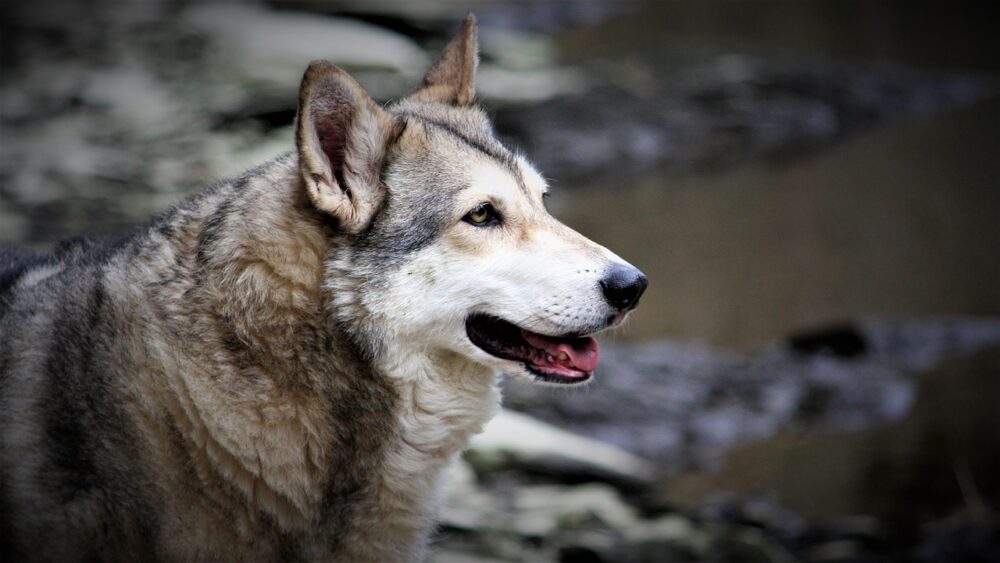The German Shepherd Wolf mix known as the “Wolfdog,” is a hybrid breed that brings together the loyalty, intelligence, and protector gene of this legendary breed with the savage instinct and physical prowess of the wolf. Due to its unique appearance and quirks, this mix has grown popular amongst enthusiasts. But, having a German Shepherd Wolf mix comes with the things of knowing their needs and behaviours, like what to expect.
In this ultimate guide, we cover the traits, history, care needs, training requirements and other commonly asked questions about the German Shepherd Wolf mix.
German Shepherd Wolf Mix – At a glance
| Weight: | 70–110 pounds |
| Height: | 24–28 inches tall at the shoulder. |
| Lifespan: | 12–15 years |
| Coat colours: | Gray, black, sable, or a mix of these colours. |
| Temperament: | Highly intelligent, loyal, shyness, skittishness, protective, independent, stubborn. |
| Suitable for: | High experienced dog owner, not suitable for firs time dog owner, not suitable for families with small children. |
| Exercise: | 2–3 hours of exercise daily. |
| Grooming: | Brush their coat at least 2–3 times a week to manage shedding, bathe them once every 2–3 months, trim their nails every 3–4 weeks. |
| Cost: | $800–$1,000 from a reputable dog breeder. |
History and origins: German Shepherd Wolf Mix
This idea of mixing wolves and dogs is not a novel one. For the German Shepherd Wolf mix, breeders have aimed to blend these two together with possibly great results: The loyalty and trainability of the German Shepherd with heightened senses and endurance from the Wolf. Because German shepherds are naturally intelligent and loyal dogs, they are often bred with wolves to achieve a dog that has both domestic and wild abilities. Whereas certain enthusiasts are attracted to the combine for its distinctiveness, others are wary associated with its erratic nature.
A Wolfdog is not a breed but a blend between one out of two German Shepherds and one out of two wolves therefore a German Shepherd Wolf mix. Once, they were bred in Germany in the late 1800s when herding was important (source), also working as military and police pups causing GSDs to be best known for their loyalty, intelligence and versatility. Unlike the common household dog, wolves are wild creatures that possess complex social structures, strong territorial instincts and great physical capabilities.
Originally the concept of crossing German Shepherds with wolves was to develop a hybrid dog that had the workability/loyalty and trainability of the German Shepherd together with enhanced sensory capabilities found in wolves combined with their wonderful wild instincts. But these hybrids tend to have a more difficult personality, since they brought along some of their wild heritage gene pool which also includes behaviors like being skittish and shy or over-reacting unpredictably.
What does a German Shepherd Wolf mix look like?
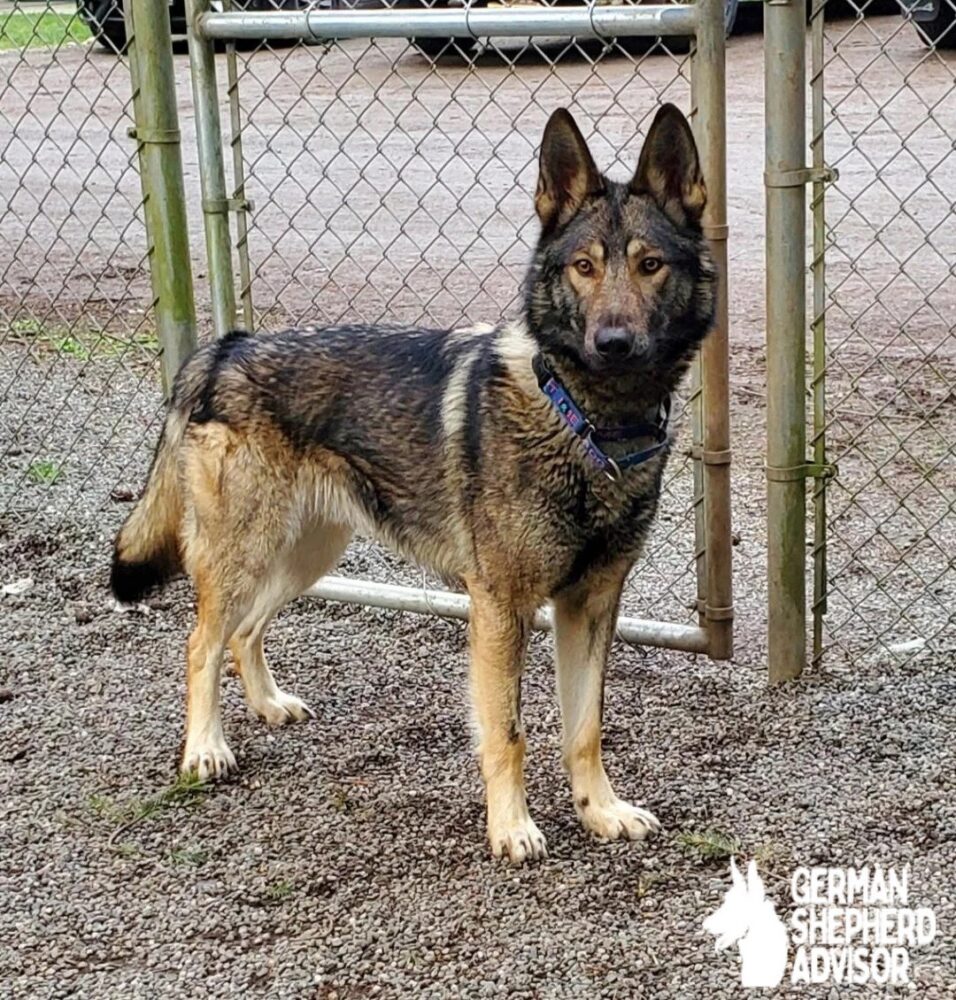
The German Shepherd Wolf mix is an imposing and majestic animal.
Here are some common physical traits:
Size: Typically, these hybrids stand between 24 to 28 inches tall at the shoulder and weigh between 70 to 110 pounds, though size varies based on the percentage of wolf genetics.
Coat: They often have a dense, double coat that is usually gray, black, sable, or a mix of these colors. The coat tends to shed heavily, especially during seasonal changes.
Eyes: Wolfdogs often inherit the piercing, almond-shaped eyes of wolves, which can range in color from amber to light brown.
Body Structure: The body of a German Shepherd Wolf mix is muscular and athletic, with a slightly elongated snout, erect ears, and a bushy tail.
What is the temperament, personality, and behaviour of a German Shepherd Wolf mix?
German Shepherd Wolf mix tends towards loyalty, independence and instinctual behaviours of both breeds. This is an inquisitive breed which can prove to be somewhat of a challenge to train, as both German Shepherds and wolves are very smart. They tend to form close bonds with their human family but can display pack behaviors, such as territorial and guarding tendencies.
The more wolf traits that are present, the more you may see independent, at times aloof behaviour in your palladium. These hybrids can have a higher prey drive as they will be more closely evaluated to their wild ancestors, making them unsuitable in homes with smaller pets.
Intelligent and curious
A German Shepherd Wolf mix is generally quite clever, as he will inherit this quality from both sides of the lineage. They are highly curious and very fast to explore any new settings. They are very intelligent, making them fast and capable learners but this can also lead to boredom if they are not mentally stimulated on a regular basis.
Independent and stubborn
Wolves are by nature solitary creatures and this character trait may be present in the GSD Wolf mix as well. Wolfdogs could have a slightly more stubborn streak than German Shepherds and may ignore commands if they don’t recognize an immediate benefit from obeying. They have a slight propensity to be not heedful, which can sometimes cause them to break bounds and make instinct-based determinations rather than follow orders.
Shy or reserved around strangers
Wolfdogs are more discreet and suspicious of strangers — a trait that has come down to them from their wolf predecessors. This shyness can come out as timidness, distance socializing and even anxiety in front of unfamiliar folks. Socialization around unfamiliar people and situations must be done consistently throughout puppyhood to minimize wariness later on.
Strong pack instinct
One distinct characteristic of German Shepherd Wolf mixes is their attitude towards hierarchy in a pack. They become very closely bonded with their owners and see them as part of their “pack” and can be extremely loyal to those they deem trustworthy. They thrive in homes with structure and routine where they know their place in the household hierarchy.
Protective but less predictable
Wolfdogs, like German Shepherds, have the potential to be territorial and protective of their home and family members. Although their wild ancestry can result in unpredictable protectiveness. Yet in response to threats they perceive as real, pets can instinctively warn of danger or misjudge a situation, becoming tense or aggressive if cornered or frightened.
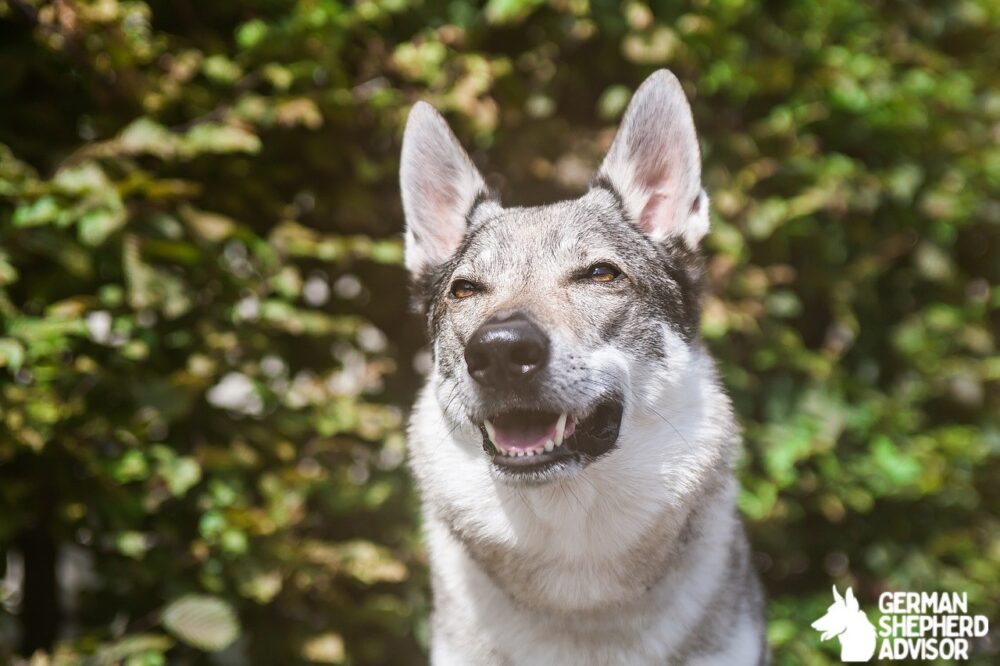
High energy and playfulness
German Shepherd Wolf Hybrid is bred for high energy and therefore needs a lot of physical activity as well as mental stimulation. They do well with regular, diverse activity (such as hiking or running) and challenging games that test their problem-solving skills. If they don’t get enough exercise, they can become anxious or destructive.
Prey drive
The wolf genes mean that German Shepherd Wolf mixes sometimes have a very high prey-drive. Their instinct might drive them towards smaller animals, like cats or other pets. Training will only go so far to curb this behavior, so owners should exercise caution with them around small animals (especially in open or uncontrolled environments).
Sensitive to surroundings
As such, this hybrid tends to be more attuned to its environment than an average pet dog. However, they may become fearful or shy if they hear loud sounds, move brusquely suddenly, or appear in an alien atmosphere. A calm, structured environment can ease the sensitivities.
Note: In some regions, Wolfdogs may be subject to specific legal restrictions or require special permits. Always check local laws before considering ownership. (below is source for further reading)
https://worldpopulationreview.com/state-rankings/wolfdog-legal-states
Is German Shepherd Wolf mix easy to train and socialize?
A German Shepherd Wolf mix can be a rewarding but challenging dog to train. The combination of the German Shepherds intelligence and trainability with the independent instinct driven wolf makes for unique training requirements for this hybrid mix. German Shepherds have are near more trainable dog and is best in obedience as working roles.
Wolfdogs tend to learn quickly and are more than happy to please. Unlike dogs, wolves are solo animals that survive primarily on instinct and do not have pack-based society, which can make training less effective. They tend to be wild and have got an independent streak due to their ancestry linked with wolves. They can learn commands but they do not obey and test their boundaries much more.
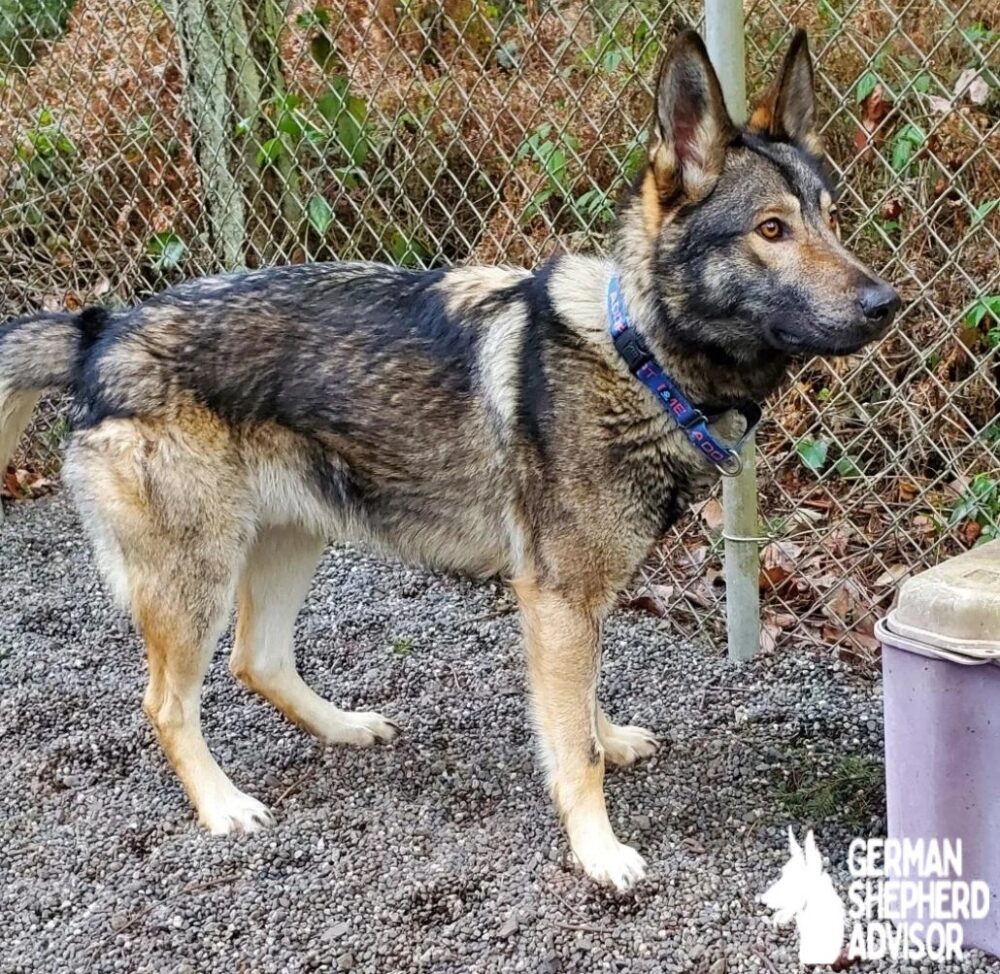
Here are some training tips for Wolfdogs
Start Early: Start socialization and obedience early, before you have to worry about getting killed by the dog. To tame the wild boys, exposure to new people, situations and places is needed early on.
Positive Reinforcement: Employ positive reinforcement techniques to reward good behaviors. Refrain from punishment because they might react badly to methods based on fear.
Advanced Commands: With their smart minds, it is good for hybrids to learn advanced commands to keep them mentally stimulated and purposeful in what they do.
Experienced Trainer: Ideally, utilize a trainer that has experience using wolfdog behavior.
Early Socialization: You should socialise your Wolfdog with great variety of people, places and animals from very early on in life if you want him or her to be more flexible.
Obedience Training: Wolfdogs are intelligent and can be easily trained in obedience, although they can also be quite stubborn. Consistency is crucial.
How much exercise does a German Shepherd Wolf mix need?
Physical and mental stimulation is a must for the German Shepherd Wolf mix, which makes it suitable for those who have access to big spaces. Regular walks, runs and play sessions are a must for these active pups. They need access to the outdoors without worrying about their escape from the outdoors area that they can have someone else’s fenced yard should you like!
Wolfdogs are high activity level dogs and they are large dogs so it makes sense that wolfdogs should eat a diet similar to what their wild ancestors would have eaten, meaning a grain-free, high-protein diet. They have a double coat, which means they shed year-round but in larger amounts for seasonal shifts. If they shed, regular brushing will help. The German Shepherd crossed with Wolf is an intelligent breed and require the high exercise and mental stimulation. Give them puzzles, teach them obedience or make it an agility practice.
How long does a German Shepherd Wolf mix live?
The average lifespan of this mix is 12-15 years, though this varies depending on care and genetics.
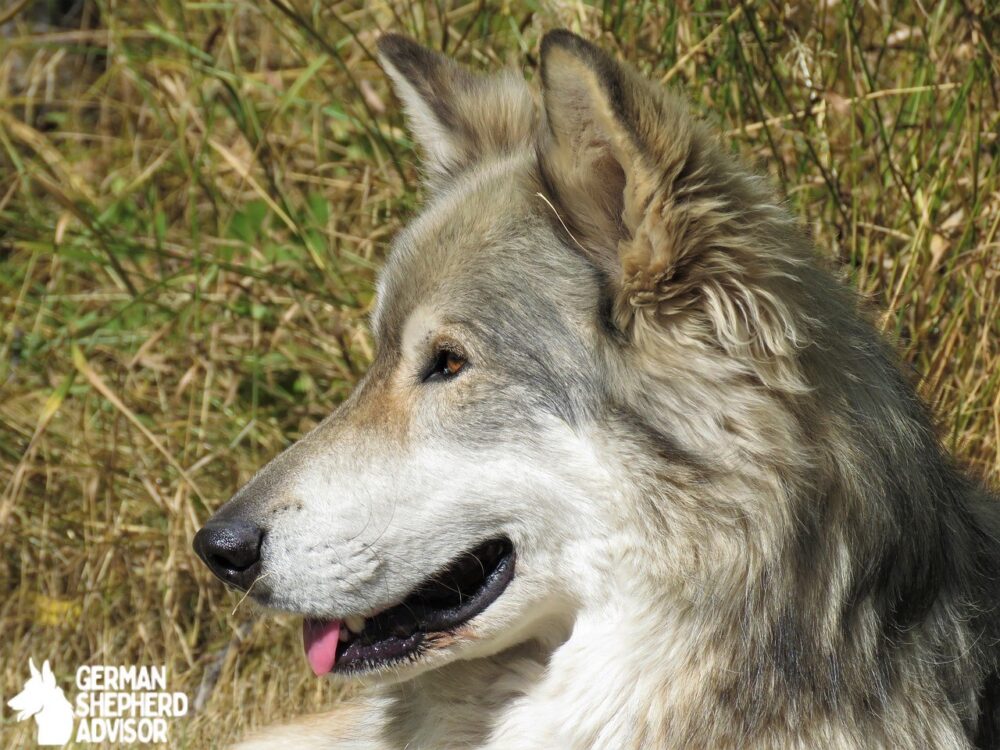
What are the common health conditions of German Shepherd Wolf mix?
German Shepherd Wolf mix hybrid breed may be prone to both genetic and common dog-related health issues.
Here are some common health concerns for German Shepherd Wolf mixes:
Hip and elbow Dysplasia
You will also want to pay special attention for Hip and elbow Dysplasia, as well as Marked hip disease because German Shepherds can be prone to developing these types of conditions over time due to performing heavy duty work for long periods of time in their lives. This hip or elbow joint malformation, seen frequently in German Shepherds, leads to painful wear and tear because the joints don’t fit properly into their sockets. The standard symptoms of Hip and elbow Dysplasia are Lameness, limping, hesitance to work out or trouble getting up. To manage dysplasia, your dog may be a candidate for regular vet check-ups, maintaining a healthy weight, joint supplements and in extreme cases surgery.
Bloat (Gastric Dilatation-Volvulus)
Breeds such as the German Shepherds that has a chow chow are a bloat risk and have large, deep-chested. Bloating is where stomach turns round on itself and collects gas or both (when trapped) no blood flows to end up chopping pet very slowly. Gastric Dilatation-Volvulus symptoms are alike in most cases: here include uneasiness, drooling a lot, bulging belly and fast breathing. Do not feed large meals in one go — don’t do vigorous exercise immediately after a meal, and slow feeders may be helpful.
Degenerative Myelopathy
Degenerative Myelopathy, a progressive disease of the spinal cord which causes uncoordinated movement and eventual inability to walk, common in German Shepherds. This disease can also be passed down from parent to the German shepherd mixed with chow-chow. Cats with DM show the same general characteristics: weakness of hind legs; loss of ability to walk in those affected legs; paralysis. A dog suffering from DM cannot be cured, but physical therapy, supplements and mobility aids may assist in keeping the dog comfortable for longer.
Preventive Care Tips for German Shepherd Wolf Mixes
To help minimize the risk of these health conditions, it’s essential to:
Regular Vet Check-ups: Frequent check-ups are crucial, especially for early detection of breed-specific health issues.
Proper Diet and Exercise: A balanced, high-protein diet and sufficient exercise help support joint health and prevent obesity.
Mental Stimulation: Prevent behavioral issues and anxiety by providing ample mental engagement through training, socialization, and enrichment activities.
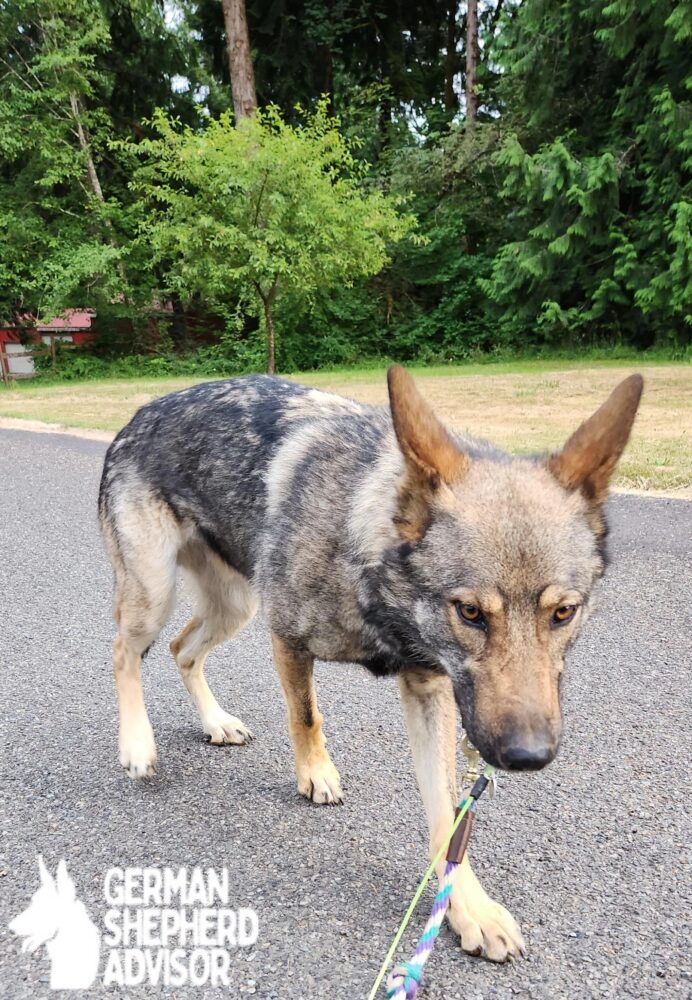
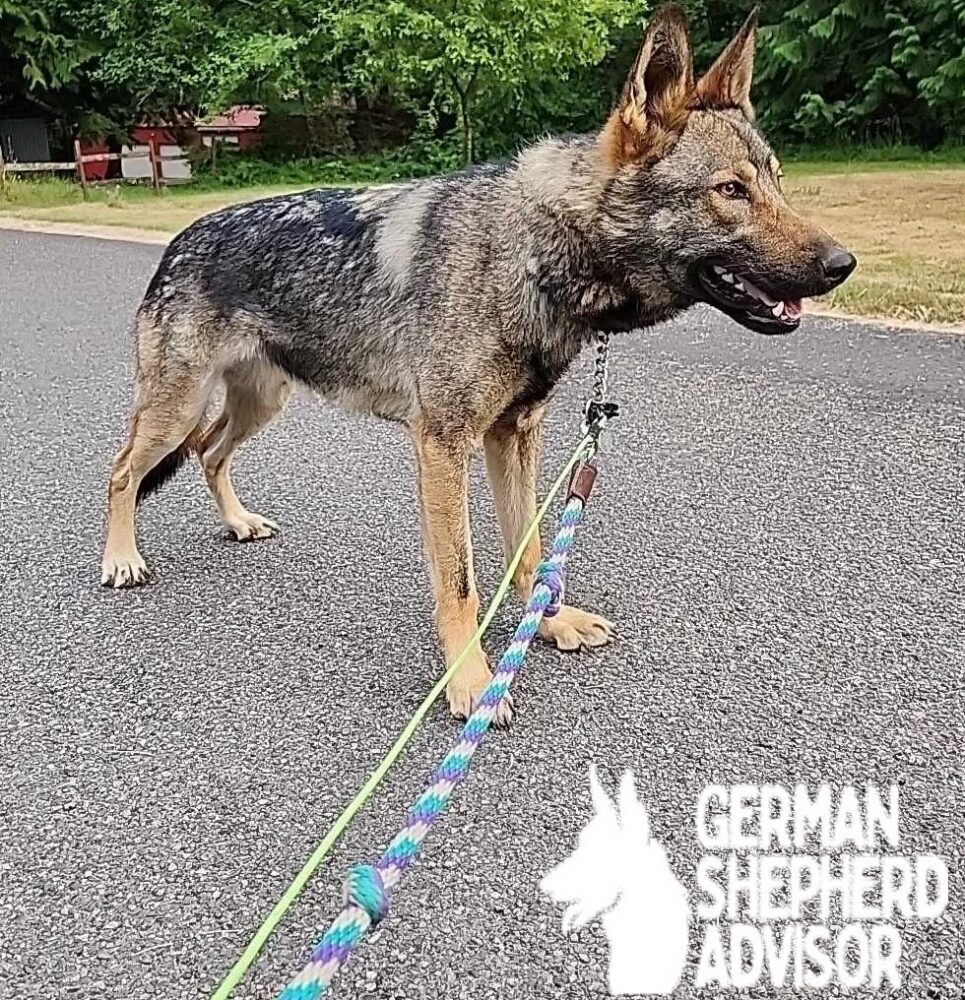
How much does a German Shepherd Wolf mix puppy cost?
German Shepherd Wolf mix puppy will cost between $800 and $1,000. But pricing can differ depending on dog breeder reputation, heritage and demand in the area. This hybrid is uncommon and illegal in some areas. Anyone considering bringing one home needs to do their research on local laws, and be phased for the traits that come with owning a German Shepherd Wolf mix.
Is the German Shepherd Wolf mix good with children and other pets?
The German Shepherd Wolf mix does not possess all the qualities necessary for an ideal family pet, especially if you are a first time dog owner and have small children or other pets in your household. Because their temperaments and behaviors are related to both dog and wolf genetics, they can be much harder in these situations too.
Interaction with Children
Some German Shepherd Wolf mixes will protect their families and that includes children if they consider them to be part of the “pack.” On the other hand, they can be cautious or timid around unfamiliar children. More often than not this combination, is sensitive to loud sounds, fast movements or crazy behaviour — typical actions of young children. Because of that, they can be prone to anxiety and/or skittishness – or sometimes even reactivity, in rare cases.
Wolfdogs are much more appropriate for homes with older, respectful children who will respect the boundaries of the pets and interact calmly and responsibly with them. Rough handling or loudness from younger children may unintentionally stress the Wolfdog.
Interaction with other Pets
German Shepherd Wolf mixes often have a high prey drive because of their wolf ancestry and may enjoy chasing small animals such as cats, rabbits, or even small dogs! While this instinct can be tempered with proper introductions and training, it is rarely completely curbed. This hybrid could display territorial qualities or attempt to dominate other pets, especially if this hybrid believes their pack position is being challenged. To distract these behaviors, proper early socialization and non-negotiable boundaries can help.
They may get along with other dogs if raised together, especially against smaller and even-tempered breeds. Also, because they can be so dominant or territorial (who isn’t in the house with them), they may not acclimate to other dogs or overly assertive temperament dogs well.
Is German Shepherd Wolf mix ideal for first-time dog owners?
In general the German Shepherd Wolf mix is for an experienced dog handler familiar with both dog and wild-animal behavior. This mix has special needs which can be problematic for first time owners.
The German Shepherd Wolf mix trainability is another characteristic we newly owners should be aware of, though they are quite intelligent and adaptable, a thorough understanding their of behavior will required plus a record keeping mind. However, they can learn with enough practice but may not ever be as reliably obedient as a fully domesticated breed such as pure German Shepherds.
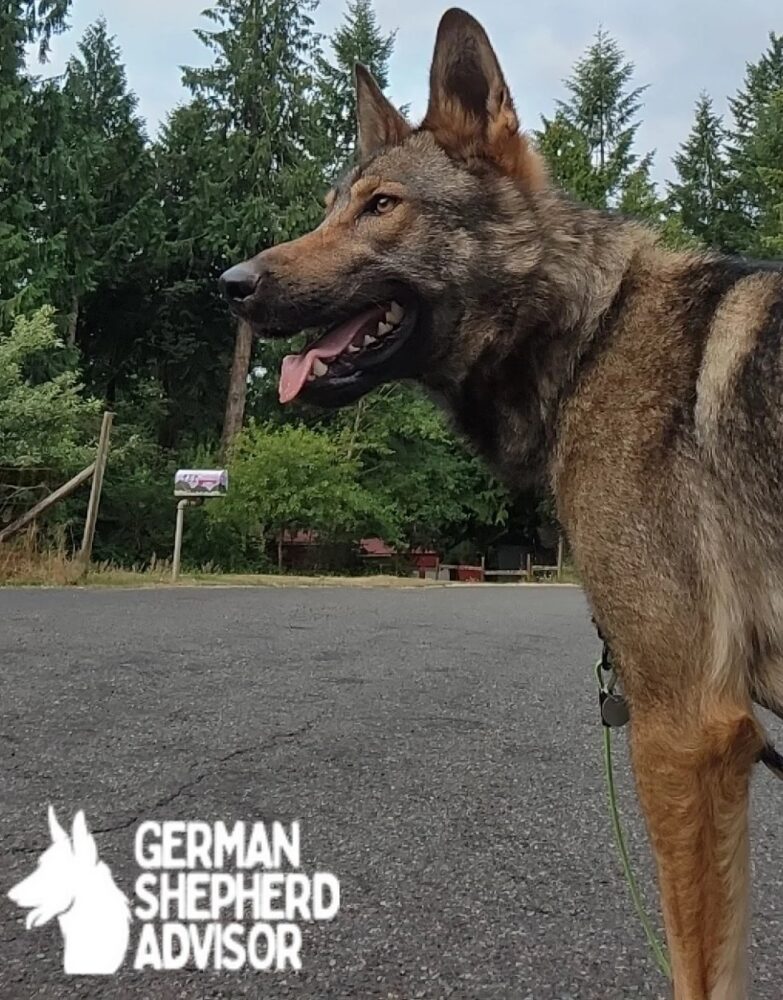
Is the German Shepherd Wolf Mix Right for You?
Having of a German shepherd wolf mix is not for everyone. In short, they require an experienced handler to make sense of their many complexities, as well as space and exercise. This mix can be rewarding if, and only if, you are willing to commit to all of their needs alongside a one-of-a-kind canine friend who is exceptionally smart.
Conclusion
The German Shepherd Wolf mix is a rare and beautiful hybrid best suited for experienced dog owners that can take care of these special breed needs. A German Shepherd Wolf mix could make a loyal and intelligent companion, but it all comes down to proper care, training and socialization. Yet anyone that owns one should know it can be quite difficult so prepare for one to create a stable and learning environment.
A German Shepherd Wolf mixed breed dog is better suited to homes with older children and no small animals. For families with small children or little pets, dealing with the hybrid’s instinctive behaviors may not be so easy. But with proper training, socialization and supervision they can co-exist in a structured home environment.
Through knowing the peculiar characteristics and needs of this blend, you can decide whether or not the German Shepherd Wolf mix is really a good companion or not for you.
Frequently asked questions (FAQs)
Laws vary widely. Some states or regions restrict or prohibit ownership due to the wolf content. Always check local regulations before acquiring a Wolfdog (source).
Generally, these hybrids are not ideal for families with small children due to their unpredictable behavior. They are best suited to experienced dog owners with ample space and time.
Expect to provide at least 2–3 hours of exercise daily. This breed thrives with regular mental and physical activities to prevent boredom-related behaviors.
Typically, Wolfdogs live between 12-15 years, though longevity varies based on their genetic makeup and overall care.
Due to their prey drive and territorial instincts, Wolfdogs may struggle with other pets, especially smaller animals. Early socialization is key, but caution is always advised.
Generally, no. Due to their size, energy, and need for space, they are better suited for homes with fenced yards.
References and sources:
- https://missionlegalcenter.com/blog/are-wolf-hybrids-legal-in-california/
- https://www.wolfeducation.org/wolves-as-pets
- https://wolfsanctuary.co/ownership/
- https://www.amazon.com/Wolfdogs-Z-Behavior-Training-Hybrids/dp/096677261X
- https://www.wolfdogawareness.com/wolfdog-basics
- https://www.theenvironmentalblog.org/2024/11/wolfdog-guide/
- https://en.wikipedia.org/wiki/Wolfdog
- https://www.dogster.com/dog-training/wolf-dog-training
- Images by: reddit, Kris Dhondt from Pixabay, Kanashi, AvinaCeleste.

